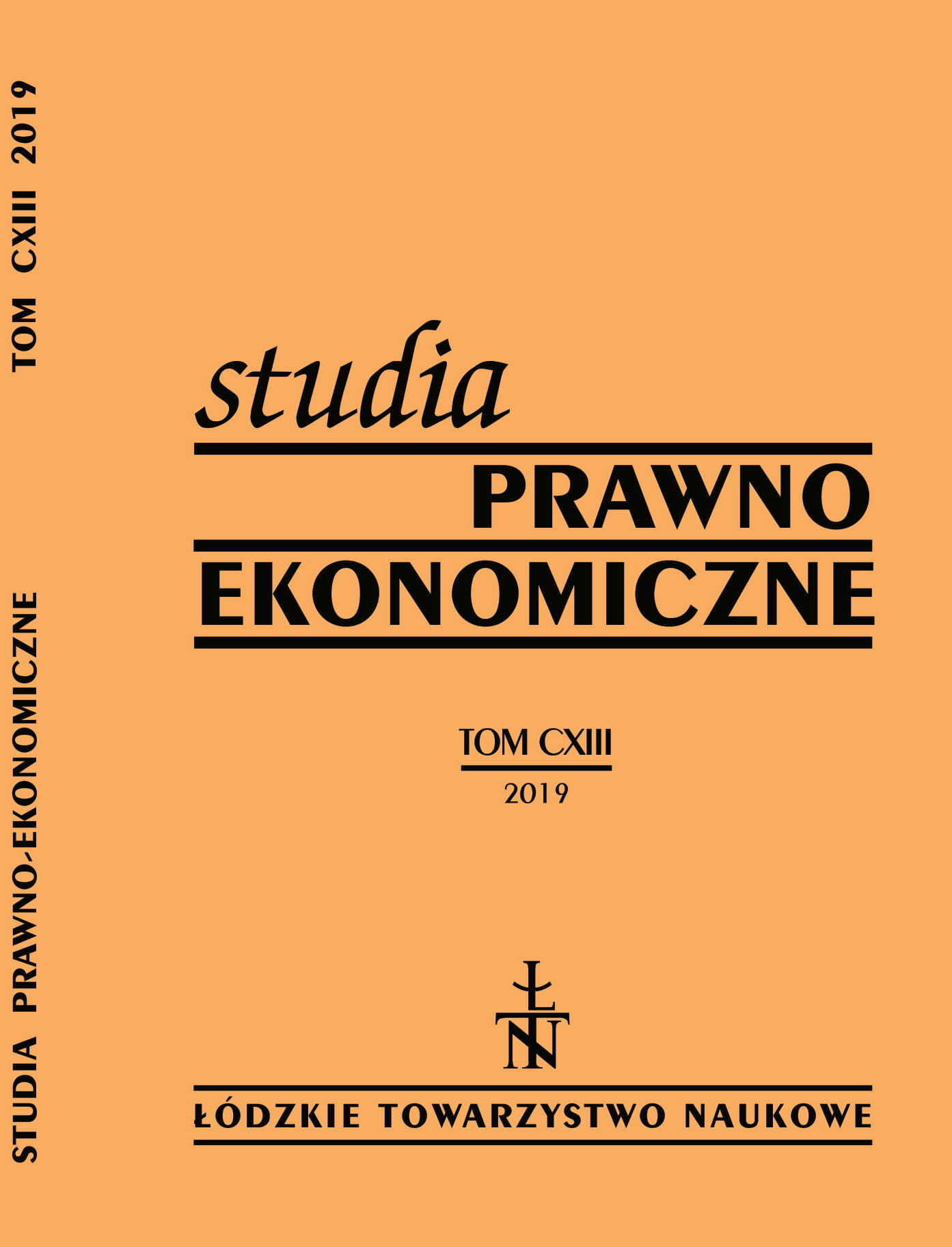Full and productive employment – an illusion or a real goal? A few comments in the context of technological change
DOI:
https://doi.org/10.26485/SPE/2019/113/9Keywords:
artificial intelligence, future of the labour market, unemploymentAbstract
Background: The subject of analysis is the impact of technological change on the future of work. The Author refers to analyses contained in the literature regarding the impact of artificial intelligence, among others, on the world of work. Particular attention is given to the issue of potential technological unemployment. The technological change will lead to polarization of the labour market through the disappearance of jobs for people with medium qualifications and people with average earnings.
Research purpose: The aim of the study is to investigate the challenges in the area of remuneration that the process of technological change will bring, the need to increase the level of lifelong learning, investigate the challenges in the area of remuneration that the process of technological change will bring, the need to increase the level of lifelong learning, or increase the intensification of work (by automating repetitive tasks).
Methods: The paper is based mostly on the analysis of literature in the field of sociology and labour economics.
Conclusions: The outlined perspective of technological unemployment requires an extension of the classical debate which is taking place in the environment of Polish scientists dealing with labour law and social security law. First, we lack extensive analysis of the concept of basic income. The second area which should be included in the debate concerns a wide spectrum of issues related to ‘work-sharing’. In the current socio-economic realities, when work is largely a basic factor in building people-to-people contacts, in achieving a sense of fulfillment or self-fulfillment by individuals, when there exists structural lack of work, work should be more evenly distributed. It seems that labour law must be transformed into the law of the “Transition period”, as a set of regulations regarding the transition period related to technological change or climate change. These would be regulations focused on labour market participants acquiring and, most importantly, maintaining ability to work and other socially useful activities.
References
Ustawa z dnia 20 kwietnia 2004 r. o promocji zatrudnienia i instytucjach rynku pracy (Dz.U. z 2004 r., nr 99, poz. 1001).
Adamczyk Sławomir, Surdykowska Barbara, Prawdziwy koniec świata fordyzmu. Jak reprezentować zbiorowe interesy pracownicze w gąszczu robotów i mikrozatrudnionych?, w: Jan Czarzasty, Czesław Kliszko (red.), Świat (bez) pracy. Od fordyzmu do czwartej rewolucji przemysłowej, Warszawa 2018, s. 459–494.
Bowles Jeremy, Chart of the Week: 54% of EU Jobs at risk of Computerisation, http://bruegel. org/2014/07/chart-of-the-week-54-of-eu-jobs-at-risk-of-computerisation/; stan na 27.10.2019 r.
Brynjolfsson Erik, Mcafee Andrew, The Second Machine Age: Work, Progress and Prosperity in a Time of Brilliant Technologies, New York, London 2016.
Cowen Tyler, The Great Stagnation: How America Ate All The Low-Hanging Fruit of Modern History, Got Sick and (Eventually) Feel Better, Dutton, New York 2011.
Dachs Bernhard, The impact of new technologies on the labour market and the social economy, http:// www.europarl.europa.eu/thinktank/en/document.html?reference=EPRS_STU(2018)614539; stan na 27.10.2019 r.
Davis Nicholas, What is the Fourth Industrial Revolution? World Economic Forum, https://www. weforum.org/agenda/2016/01/what-is-the-fourth-industrial-revolution/; stan na 27.10.2019 r.
Freeman Richard, The Great Doubling: The Challenge of the New Global Labor Market, w: John Edwards, Marion Crain, Arne L. Kalleberg (red.), Ending Poverty In America: How to Restore the American Dream, The New Press, New York 2007, https://webcache.googleusercontent. com/search?q=cache:BMAEYxN9ZmgJ:https://eml.berkeley.edu/~webfac/eichengreen/ e183_sp07/great_doub.pdf+&cd=2&hl=pl&ct=clnk&gl=pl
Frey Carl B., Osborne Michael, The Future of Employment: How Susceptible Are Jobs to Com¬puterisation? Working Paper, https://www.oxfordmartin.ox.ac.uk/publications/view/1314; stan na 27.10.2019 r.
Goos Maarten, Manning Alan, Salomons Anna, Explaining Job Polarization: Routine- Biased Technological Change and Offshoring, https://www.aeaweb.org/articles?id=10.1257/aer. 104.8.2509
Gordon Robert, The Demise of U. S. Economic Growth: Resentment, Rebuttal and Reflections, https://www.nber.org/papers/w19895; stan na 27.10.2019 r.
Greenfield Adam, Radical Technologies. The Design of Everyday Life, Verso, London 2017.
Laurent Éloi, Pochet Philippe, Towards a social-ecological transition. Solidarity in the age of environmental challenge, ETUI 2015, https://www.etui.org/Publications2/Guides/Towards-a-social-ecological-transition.-Solidarity-in-the-age-of-environmental-challenge; stan na 27.10.2019 r.
Madej-Kaleta Marta, Nowoczesne technologie w gospodarce a ochrona pracowników w prawie pracy, w: Monika Latos-Miłkowska, Łukasz Pisarczyk (red.), Prawo pracy. Między gospodarką a ochroną pracy. Księga Jubileuszowa Profesora Ludwika Florka, Warszawa 2016, s. 252–262.
OECD Digital Economy Outlook 2015, OECD, Paris 2016.
Pianta Mario, Technology and employment. Twelve stylized facts for the digital age, https://mpra. ub.uni-muenchen.de/84391/; stan na 17.02.2019 r.
Prassl Jeremias, Risak Martin, Uber, TaskRabbit, & Co, Platforms as Employers? Rethinking the Legal Analysis of Crowdworking, https://papers.ssrn.com/sol3/papers.cfm?abstract_ id=2733003; stan na 17.02.2019 r.
Surdykowska Barbara, Kilka myśli o roli pracodawców w procesie podnoszenia kwalifikacji zawodowych w miejscu pracy, Dialog. Pismo Dialogu Społecznego 2017/2, s. 15–23.
Surdykowska Barbara, Umowy o pracę na czas nieokreślony jako podstawa bezpieczeństwa socjalnego – kilka refleksji, w: Anna Musiała (red.), Nauka i praktyka w służbie człowiekowi pracy: Umowy terminowe, Poznań 2018, s. 205–214.
Szlinder Maciej, Bezwarunkowy dochód podstawowy, Warszawa 2018.
United Nations, 2016, Global Sustainable Development Report, https://sustainabledevelopment. un.org/index.php?page=view&type=400&nr=2328&menu=1515; stan na 17.02.2019 r.
World Bank, World Development Report 2016, Digital Dividends, http://www.worldbank.org/en/publication/wdr2016; stan na 17.02.2019 r.







